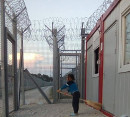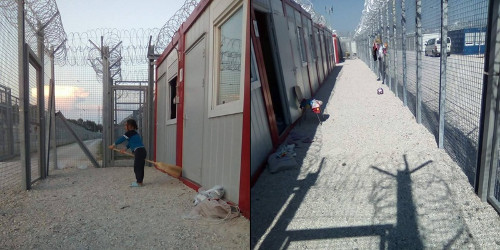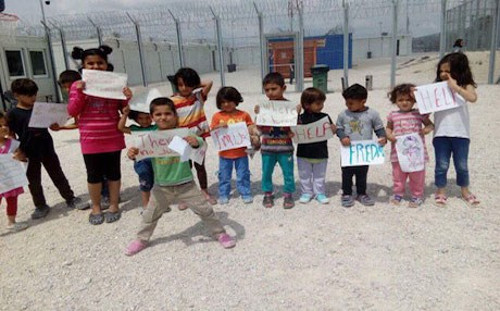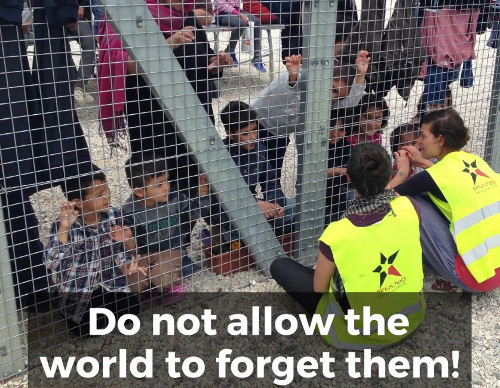
The situation in the Hungarian "Transit zones" for asylum seeker is horrible, with no proper food, medical care or education. It's worse than in many prisons. Reports by media and the Hungarian Helsinki Committee show the violation of fundamental (human) rights.
Life in the Hungarian transit zones: no proper food, medical care or education
An Afghan-Iranian family with three children waited eight months at the Serbian-Hungarian border to be able to apply for refugee status. After the long wait, in April 2017 they were admitted to the so-called 'transit zone' where they were practically locked up behind barbed wire for four months. They told Atlatszo.hu about the inhumane conditions in the transit zone: no food for the father, harassment and doctor's visits in handcuffs. Hungarian authorities want to keep the conditions in transit zones a secret, but :: atlatszo.hu were shown cell phone photos that were taken inside.
Zoltán Somogyvári, an attorney with the Hungarian Helsinki Committee told Atlatszo that right now there are 470 asylum seekers living in the transit zones and 206 of them are children.
Press is not allowed to visit the transit zones but according to those who left and according to the European Court of Human Rights the conditions are inhumane.
Read the full article in :: atlatszo.hu
A video from Atlatszo is availabe at :: vimeo.com/231063604.

The 'yard' in the Röszke transit zone.
On the question of "legality" of the fence and the transit zone
Migszol reported about :: fences, national securities and solidarity.
The transit zones and their procedures violate several points even of the already inadequate Geneva Convention and the Convention on the Rights of the Child, which stipulates that children should not be detained.
Life in the transit zones is criminalised as people are detained behind bars and razor wire during the entire duration of their asylum procedure - the latest legal development that Fidesz introduced only in March 2017. People staying in the transit zones are being constantly humiliated, living for months in a non-airconditioned container with one window. Often, large families are lumped together, their only alternative being to spend their day in a small inner courtyard with no shadow whatsoever. People are handcuffed when they need a doctor and are accompanied by armed security guards carrying batons and sprays anywhere they go within the detention complex.
People are placed behind bars without having committed any crime, and this, in the name of the elusive, all-encompassing term of national security, which can be recalibrated according to the needs of each occasion. An asylum policy based on facts would also mean clarifying the concepts in circulation: for instance, what is exactly meant by "public security"? At the moment, the people who suffer most from public security are precisely the minorities: people of LGBTQ background, roma, migrants, people with a different skin colour.
Another set of legislation is built to make the asylum application procedure incredibly difficult, with arbitrary rules such as announcing Serbia as a safe third country. The result is that after many months of being roasted under the sun and inside non-airconditioned spaces they may be pushed back to Serbia with no options left. All of this is done under the name of legality.
Read the full report by :: migszol.com.

A group of children raising slogans criticizing their "miserable" conditions at Tompa camp in Hungary. (Photo by Haider Ali)
Minimum standards required in the transit zones on the Hungarian land borders
A background note by the Hungarian Helsinki Committee (HHC) provides a list of the most urgent changes that would ensure that confinement in the transit zones in Hungary is in line with relevant international, EU and domestic standards of detention.
Summary of the Background note by the HHC
Placement in the transit zone, despite the Hungarian government's continuous claims to the contrary, is a form of unlawful detention, as it is clearly stated in the European Court of Human Rights' judgement in the case of Ilias and Ahmed v. Hungary of 14 March 2017. The current legal and operational context of the Hungarian transit zones is thus untenable. From a legal perspective, the lack of issuance of (individualised) detention orders violates the Hungarian Fundamental Law as well as the
European Convention on Human Rights. As of 28 March 2017, all applicants with the sole exception of unaccompanied asylum-seeking children under 14, are, by virtue of lodging an asylum application, confined to their respective closed sector within the closed transit zone. From an operational perspective, the transit zones in their current state are unfit for accommodating people for a longer period of time, and are unfit for accommodating people belonging to vulnerable groups for even a shorter period of time. This is partly due to the physical infrastructure (small metal containers without the possibility of proper natural ventilation and without air conditioning), the lack of shelter against inclement weather outside of the metal containers, the lack of access to reliable telecommunications networks, the lack of access to shopping opportunities, the lack of space and equipment for varied and purposeful activities. Neither educational, nor psycho-therapeutic services are available. There is a systemic inadequacy of interpreters and they are only available for the purposes of the asylum procedure (e.g. not during medical examinations).
That conditions are inadequate is not only exemplified by the interim measures granted by the European Court of Human Rights in the case of dozens of applicants indicating to the Hungarian Government to place the applicants in an environment that meets the requirement of Article 3 of the Convention , but also by the accounts of asylum-seekers held there for months. According to the statements of the asylum-seekers themselves, and the psychiatrists and psychotherapists of the Cordelia Foundation who meet some of these asylum-seekers in an open reception centre once they had been released, the physical, and particularly the mental state of many of them - including children - are worryingly deteriorating. The fundamental, systemic shortcomings of the current conditions in the transit zones is further demonstrated by the experience of civil society organisations working with beneficiaries of international protection, according to which almost all refugees and beneficiaries of subsidiary protection leave Hungary upon their recognition and release from the transit zones - in great part as a result of their traumatising experience at these inadequate detention facilities.
In order to ensure that the placement in the transit zones meet the minimum standards, both the current legal and operational framework must be fundamentally altered.
Read the full report :: here as PDF.

Still from a :: video by Migration Aid.



 Minimum standards required in the transit zones on the Hungarian land borders
Minimum standards required in the transit zones on the Hungarian land borders grenzregime
grenzregime